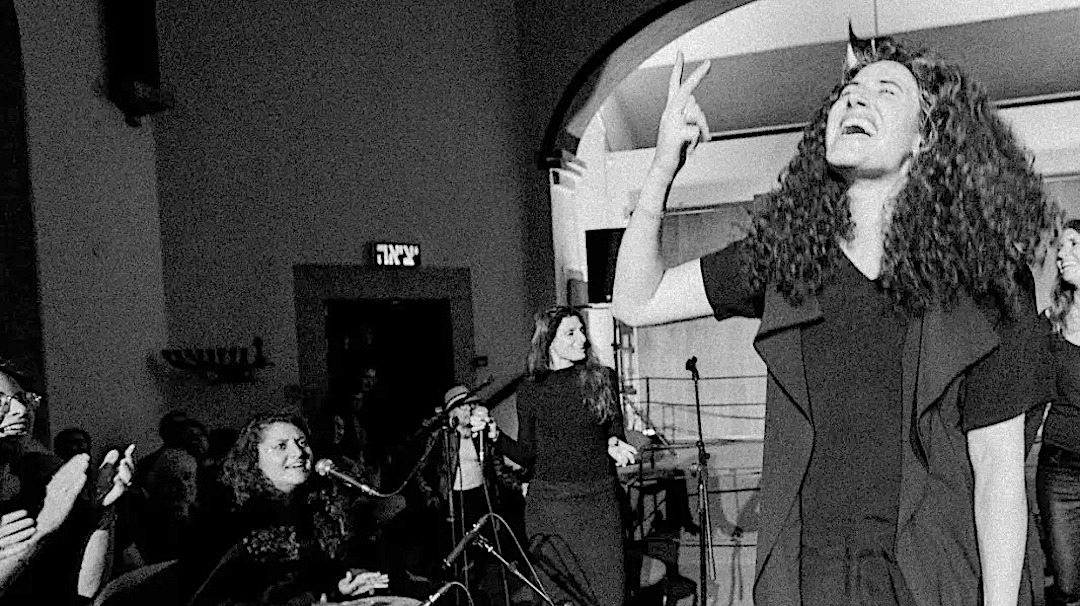Performing hasidic music, these women are transcending gender and the Orthodox-liberal divide
A concert at JCC Manhattan will celebrate ‘Kapelya,’ the first recording of hasidic nigunim performed exclusively by women

Chana Raskin is the founder and main facilitator of RAZA, whose album “Kapelya” is a collection of traditional Chabad niggunim sung by a group of 22 women. (Courtesy RAZA)
(JTA) — As a child growing up in the Chabad hasidic community of Crown Heights, Brooklyn, Chana Raskin was immersed in a male soundscape. Her father brought her with him to synagogue on Shabbat and holidays, where men would sing the melodies, passed from generation to generation, known as nigunim. Those sonic memories tap into family tradition and a spiritual community beyond herself. Yet these sounds were missing from her adult experience of conventional Orthodoxy. Following a minor traumatic brain injury, Raskin began a personal healing journey and found comfort in these melodies.
During this process, she felt the need to share her knowledge with women who, like her, did not have access to the restorative communal potential of the nigun. The often wordless songs are traditionally sung exclusively by men, and are central to the synagogue experience — itself a primarily male domain in the Orthodox tradition.
“A few years into his journey, during a particularly dark week in December 2017, three different women reached out to me about bringing women together to sing,” Raskin recalls in an essay. “I remember thinking: Yes. (Pause, breath.) Yes, let’s do it.”
The result was the RAZA circle and the the album “Kapelya,” the first recording of hasidic nigunim performed exclusively by women. On Thursday, Aug. 10, Raskin and the RAZA ensemble will have their premiere in New York City at the JCC Manhattan to celebrate “Kapelya,” which was released in February.
Produced by Hadar’s Rising Song Records, “Kapelya” is a collaboration among Raskin, women artists from non-Orthodox Jewish backgrounds and the musician Joey Weisenberg, the founder and director of Hadar’s Rising Song Institute. With this project, Raskin proposes a new meaning and aesthetic for hasidic nigunim. She breaks many barriers, exploding audience expectations of these traditional melodies and using them as a vehicle to transcend gender divisions, Jewish denominations and musical genres.
Although the album contains only women’s voices, contrary to convention, Raskin did not label it, nor her performances, as gender specific, contrary to the norm in the Orthodox female art scene I researched for my forthcoming book, “For Women and Girls Only” (NYU Press, 2024). She wanted the music to be available to anyone who wanted to connect with it.
The nigunim that the RAZA ensemble recorded and will perform belong to Chabad-Lubavitch’s sacred soundscape. While they can be sung, separately, by both genders, nigunim are associated with men because of their centrality to their collective spiritual practice. These old Jewish melodies have come to exemplify masculinity, tradition, mysticism and ecstasy, all elements of hasidism’s roots.
Because of the religious injunctions of tzniut (sexual modesty) and kol isha (prohibiting Orthodox men from hearing women singing), hasidic women traditionally sing in still more strictly gender-segregated spaces, only for other women. They have developed a distinctive soundscape, different from that of their male counterparts, and one in which nigunim have not played a major spiritual role.
In this context, women performing and recording nigunim for a mixed audience is both an innovation and a provocation.
While the media coverage of the album’s release emphasized the innovation of “giving voice to women,” I argue that by celebrating the voice of women in the male tradition of nigunim, Raskin’s project transcends both gender boundaries and the divide between Orthodox and liberal Judaism. At the concert, even if women lead on-stage, all genders and denominations can participate in belonging to Jewishness through sound infused with spirituality, healing and tradition. To emphasize the spiritual aspect of the project, the album’s booklet offers a short description of the origin and meaning of each nigun, a dedication and transliterations and translations of the prayers. The project puts hasidic music in the hands of women and bridges the divide between Orthodox and liberal Jews, who can meet in a shared domain of song, representing both rebellion and connection.
The album’s originality resides both in the new meanings it gives to hasidic music, and in the novel aesthetic it provides for nigunim. Listeners are treated to collective improvisation and refined vocal and instrumental arrangements, accompanied by instruments or sung a capella. The album surprises in its vocal and instrumental colors, with percussion, guitar, flute, cello, shruti box, kaval, mandolin and octave mandolin. With these unusual instruments, the performers create unique relations with place, time and sound unprecedented in the nigun genre.
The success of RAZA Circle’s album (Thursday’s show is sold out) points to the growing number of North American Jews, both observant and secular, who are searching for new ways to connect with Jewish tradition, prayer and spirituality while transcending conventional norms, expectations, and processes in their very different circles. This project showcases not only women’s voices, but the yearning of both Jewish men and women for opportunities to satisfy their thirst for community, something that their respective religious authorities have failed to provide.
This article originally appeared on JTA.org.
A message from our Publisher & CEO Rachel Fishman Feddersen

I hope you appreciated this article. Before you go, I’d like to ask you to please support the Forward’s award-winning, nonprofit journalism during this critical time.
We’ve set a goal to raise $260,000 by December 31. That’s an ambitious goal, but one that will give us the resources we need to invest in the high quality news, opinion, analysis and cultural coverage that isn’t available anywhere else.
If you feel inspired to make an impact, now is the time to give something back. Join us as a member at your most generous level.
— Rachel Fishman Feddersen, Publisher and CEO






















